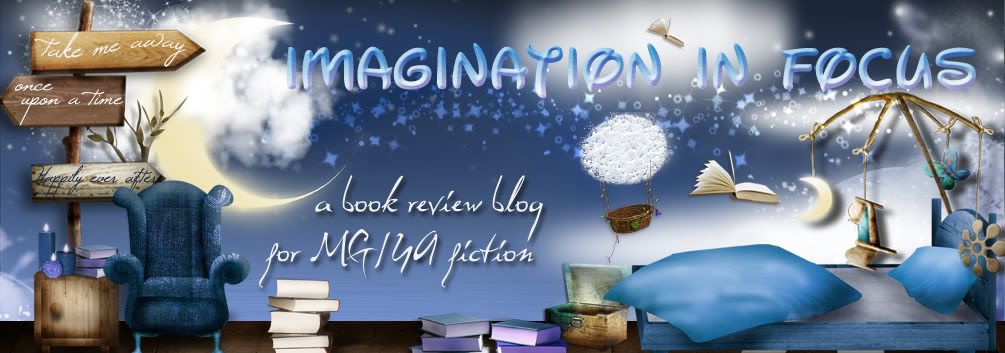Tonight I am so pleased to have my good friend Isis here to talk about - what else? - Young Adult literature, specifically trends we see a lot regarding the main character/storyteller. Isis is not a blogger: there's no conflict of interest, no reason for anything but an honest look into some of the hottest books on the shelf.
Take it away, Isis!
In the past couple of years, I’ve been noticing a trend concerning the representation of girls in YA paranormal and dystopian books lately. There are, essentially, two types of girl characters that have really caught my eye: the uberbitch strong girl, and the badly developed doormat. I think this is a problem, because I don’t think either of these character types are especially relatable to, or representative of, teens today.
As a warning: I’m the sort of person who names names. But my use of a book as an example in this post doesn’t mean, necessarily, I didn’t like it. My intention isn’t to “bash” the writing of these authors, or to be hard on their characters. This is something I’ve observed, simple as that.
I’ll start with the
uberbitch. My favorite uberbitch (favorite to pick on, I mean) is Katsa from Kristin Cashore’s
GRACELING. Katsa is the definition of strong-in-a-very-cliched-way. She’s physically

capable, resourceful, and emotionally distant.
The first two I don’t take issue with (though her physical prowess is a gift of magic, any athlete is physically capable, whether male or female, and many teenagers are extraordinarily resourceful and intelligent). But her emotional distance, and her extreme and harshly expressed distaste and hatred for marriage and kids makes her a difficult character to like. That by itself also wouldn’t be enough to make me condemn her as a character (it’s a viewpoint some people, though admittedly NOT many, carry) but it’s the combination of all of these things. Everything about her is hard. Katsa lacks softness, emotions, that most teenage girls have. Even when she realizes she falls in love with Po, it’s a painful thing to read because she thinks the emotions weaken her. They do, in a sense, because she doesn’t know how to deal with them—but it’s more than that. She doesn’t even want them in the first place, because they get in her way. It’s almost as though to be strong physically, she also has to be “strong” (in an archaic caveman sort of way) emotionally as well.
I’m assuming we’ve all read THE HUNGER GAMES—if not the entire trilogy, then at least some  part of the first book. I had very similar issues with Katniss. She was extremely unrelatable as a character because of her emotional distance and her lack of understanding about what I would consider the some of the most basic emotions. Katniss demonstrated herself as a very smart individual: she survives the hunger games (twice) just as much by using her brain as by using her hunting skills. Yet how can she be so dense when it comes to Peeta? I felt like Katniss’ emotional issues went far beyond the normal anxiety that goes along with a first love. I had a hard time believing someone so smart honestly couldn’t put together the most basic thought process about another person she cares about. In MOCKINGJAY, she treats everyone so horribly, because she is such a hard person. Like Katsa of GRACELING, Katniss is almost impenetrable—and there’s at least a part of her that thinks keeping herself emotionally distant makes her stronger, which is not a totally irrational thought-process. But after certain characters proved themselves over and over to be worthy of Katniss’ trust, she still didn’t trust them. That’s irrational.
part of the first book. I had very similar issues with Katniss. She was extremely unrelatable as a character because of her emotional distance and her lack of understanding about what I would consider the some of the most basic emotions. Katniss demonstrated herself as a very smart individual: she survives the hunger games (twice) just as much by using her brain as by using her hunting skills. Yet how can she be so dense when it comes to Peeta? I felt like Katniss’ emotional issues went far beyond the normal anxiety that goes along with a first love. I had a hard time believing someone so smart honestly couldn’t put together the most basic thought process about another person she cares about. In MOCKINGJAY, she treats everyone so horribly, because she is such a hard person. Like Katsa of GRACELING, Katniss is almost impenetrable—and there’s at least a part of her that thinks keeping herself emotionally distant makes her stronger, which is not a totally irrational thought-process. But after certain characters proved themselves over and over to be worthy of Katniss’ trust, she still didn’t trust them. That’s irrational.
But o n the other side, there’s what I call the badly developed doormat. In a name: Bella Swan. Bella is written as being apparently intelligent, good at school, and self-sufficient. Before she meets Edward, when she shows up in Forks, she’s presented to us readers as someone who can take care of herself. But that all goes flying out the window when Edward shows up. Bella completely loses herself in her romantic relationship, and all that intelligence, self-sufficiency, and general fortitude totally disappear. Having a whirlwind first love is one thing. Becoming nothing more than an extension of your lover, completely losing what little personality you once had, is a different thing. My problem with Bella is that I don’t see undying love. All I see is a dangerous obsession. Bella has no identity without Edward. That’s not representative of teenage girls, either. Yes, they get sucked up into their boyfriends, but when it’s this much of a stalker-stalkee relationship, it’s not usually a positive experience. And while teenage girls don’t always know who they are, they most certainly do have unique identities and personalities that are hard to eclipse. Plus, what kind of message is that for girls? Lose yourself, totally and completely, in your boyfriend. Give up your entire life for him. Be defined by how he sees you. That’s not romantic.
n the other side, there’s what I call the badly developed doormat. In a name: Bella Swan. Bella is written as being apparently intelligent, good at school, and self-sufficient. Before she meets Edward, when she shows up in Forks, she’s presented to us readers as someone who can take care of herself. But that all goes flying out the window when Edward shows up. Bella completely loses herself in her romantic relationship, and all that intelligence, self-sufficiency, and general fortitude totally disappear. Having a whirlwind first love is one thing. Becoming nothing more than an extension of your lover, completely losing what little personality you once had, is a different thing. My problem with Bella is that I don’t see undying love. All I see is a dangerous obsession. Bella has no identity without Edward. That’s not representative of teenage girls, either. Yes, they get sucked up into their boyfriends, but when it’s this much of a stalker-stalkee relationship, it’s not usually a positive experience. And while teenage girls don’t always know who they are, they most certainly do have unique identities and personalities that are hard to eclipse. Plus, what kind of message is that for girls? Lose yourself, totally and completely, in your boyfriend. Give up your entire life for him. Be defined by how he sees you. That’s not romantic.
HALO by Alexandra Adornetto exhibited many of the same problems, but in a way it was wo rse because the protagonist Bethany was the angel (the supernatural being with supposed powers) and the guy was just a human. Being a supernatural being could have meant that Bethany could have had advantages of strength or magic of some kind. But she didn’t. Being very human in personality could have balanced out her supernatural strength well, in that it could still have given her the capability to love and be a dynamic character, making a nice contrast with her abilities. But she has no abilities. At all. And instead of loving, she becomes a shallow, vain, horrible example of a girl with an obsessive crush. Indeed, the supernatural powers are almost forgotten as Bethany lets herself be eaten up by a relationship with a boy who treats her like she’s tissue paper in a rainstorm.
rse because the protagonist Bethany was the angel (the supernatural being with supposed powers) and the guy was just a human. Being a supernatural being could have meant that Bethany could have had advantages of strength or magic of some kind. But she didn’t. Being very human in personality could have balanced out her supernatural strength well, in that it could still have given her the capability to love and be a dynamic character, making a nice contrast with her abilities. But she has no abilities. At all. And instead of loving, she becomes a shallow, vain, horrible example of a girl with an obsessive crush. Indeed, the supernatural powers are almost forgotten as Bethany lets herself be eaten up by a relationship with a boy who treats her like she’s tissue paper in a rainstorm.
At this point you’re probably wondering, “Well gee, Isis, is there any YA book you actually DO LIKE?” In fact there are a lot. For my purposes, I’ll be talking about WONDROUS STRANGE by Lesley Livingston, but rest assured, there are many other YA books I think have great teen girl protagonists. Kelley Winslow, the protagonist, is a really great balance between being resourceful and intelligent (strong), but also having realistic emotions and reacting to them in what I’d consider a very realistic way (rather than becoming an obsession zombie, or becoming a hard shell of a person who pushes everyone away). Kelley knows what she wants, and she goes after it. She’s self-sufficient enough to live without parental supervision in New York City, but she’s not so grown up that she’s hard to relate to. Her involvement in the faerie world comes with struggles, but Kelley finds her way through things without managing to screw up horribly because she’s too dependent on some boy to do anything by herself—but, realistically, she still makes mistakes. Just not mistakes so stupid (like going to confront a vampire you know is going to KILL YOU and not telling anyone about it) that she can’t think her way out of them. But speaking of romance, the relationship with Sonny is written in such a charming way. There was the real shyness of first love, the tension of two people thrown together and not quite sure they can trust each other, and the blossoming of emotions that were raw and deep. Of all the characters I’ve talked about so far, Kelley is by far the most well-rounded, dynamic, and developed. (WONDROUS STRANGE, in my opinion, also has the best plot and the best writing, but that is another story.)
Thank you so much, Amelia, for inviting me to guest post on your blog! Writing this post was really a lot of fun for me.
Isis is a twenty-something (like you!) who loves to read books of all kinds, but especially YA, and who probably wastes too many hours of her life on Goodreads.--
Thank you, Isis, for stopping by tonight!
If any of you would be interested in guest posting at Imagination in Focus (writing on any topic you'd like, saying whatever you like!) leave a comment with your email and I'll be sure to get in touch ;)





















































